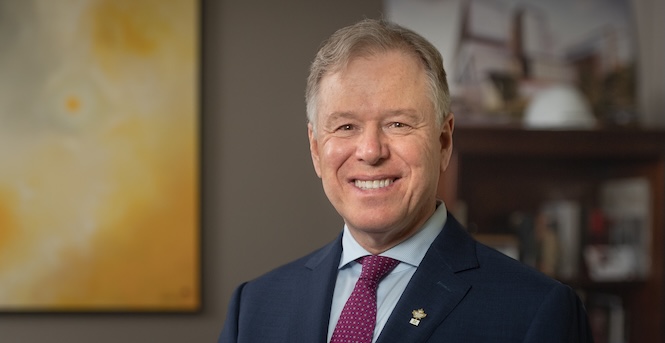In today’s fast-paced world, where meetings are often back-to-back and priorities seem endless, it can be difficult to carve out time for meaningful leadership development and mentorship conversations. Yet, it is these very moments of connection and reflection that often drive the most profound personal and professional growth. As the CEO of Sunnybrook Health Sciences Centre, I’ve found that one of the most powerful ways to foster these conversations is through a dedicated, deliberate practice of walking. While walking has worked for me, my key message is not about the method but about making time and space for authentic conversations that help develop future leaders.
Mentorship and leadership growth require more than occasional advice or feedback. They thrive when given focused, intentional attention. This is why I’ve intentionally made space for leadership conversations by dedicating time to walk with colleagues, emerging leaders, and community partners.
It started several years ago when I first started in my role as vice president when a vice president at a peer hospital and I began walking together. Both of us were recovering from joint surgeries, so we took to the ravines that connect our two hospital catchments. Over time, these walks evolved into something more. They became a time to step away from our offices and truly connect with one another, discussing everything from organizational culture to leadership challenges. By taking the conversation outside the traditional setting of a meeting room, we were able to engage more creatively and reflect more deeply. As I moved into the CEO role at Sunnybrook, that peer became the CEO of Orillia Soldiers Memorial Hospital, and I continue to value these walking conversations as a vital part of my leadership practice.
Walking provides a unique opportunity to slow down and think. There’s something about moving through nature, whether it’s a forest, a park, or a city street, that opens up the mind. Research supports the idea that physical movement, especially walking, enhances mental clarity, sparks creativity, and fosters deeper reflection. When you walk with someone, you’re not sitting across from them at a desk. Instead, you’re side by side, engaging in a dynamic flow of conversation, where ideas can emerge more organically. The rhythm of the walk allows you to focus on the conversation without the usual distractions of emails, phones, or meeting agendas.
The power of these walks isn’t just about the physical movement, but the mindset it encourages. Whether it’s a challenging leadership decision, a tough conversation with a team member, or a moment of self-reflection, walking provides a space to think through solutions in a more relaxed, open way. I’ve walked with emerging leaders who needed guidance on how to approach quality improvement projects or navigate the complexities of organizational change. And more often than not, they walk away with clearer heads and new ideas. I often receive notes of thanks afterwards, with many participants sharing how the conversation helped them think more clearly or feel more confident about their next steps.
A central question I always ask during these walks is simple yet powerful: How can I help you today? It’s a question that puts the focus on the other person, allowing them to identify what they need in order to move forward. Whether it’s overcoming a specific challenge or brainstorming solutions to a larger problem, this question encourages reflection and clarity. It’s a way of empowering others to take ownership of their development, while also providing the support they need to succeed.
Another important aspect of these mentorship conversations is the reminder that leadership and problem-solving in healthcare are not about us as individuals. It’s easy to become fixated on our own role or success, but the heart of leadership is about the people we serve—the patients, our teams, and the communities we support. By helping others refocus on what matters most—the people and teams they lead—many of the challenges they face can be reframed, leading to clearer and more compassionate solutions.
The beauty of mentorship is that it’s not a one-size-fits-all approach. Each person has different needs, preferences, and learning styles. What’s important is that we make time for it, whether it’s through a walk in nature, a structured meeting, or an informal chat during a commute. These conversations, however they happen, are the cornerstone of effective leadership development.
I encourage you to create dedicated time for leadership conversations and mentorship, whether it’s through walking, talking, or another approach that works for you. Ask the questions that matter, focus on the people you serve, and take the time to listen. These moments of connection will not only help you grow as a leader, but will also help others around you develop the skills, confidence, and perspective they need to lead effectively in the future. And for some of us, walking will also serve as great rehabilitation post-surgery.
Dr. Andy Smith is President & CEO, Sunnybrook Health Sciences Centre.

